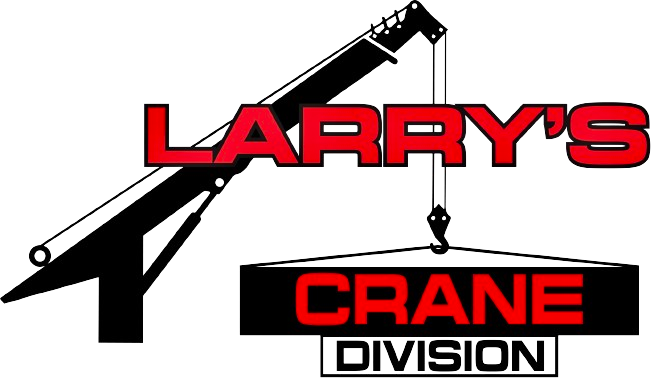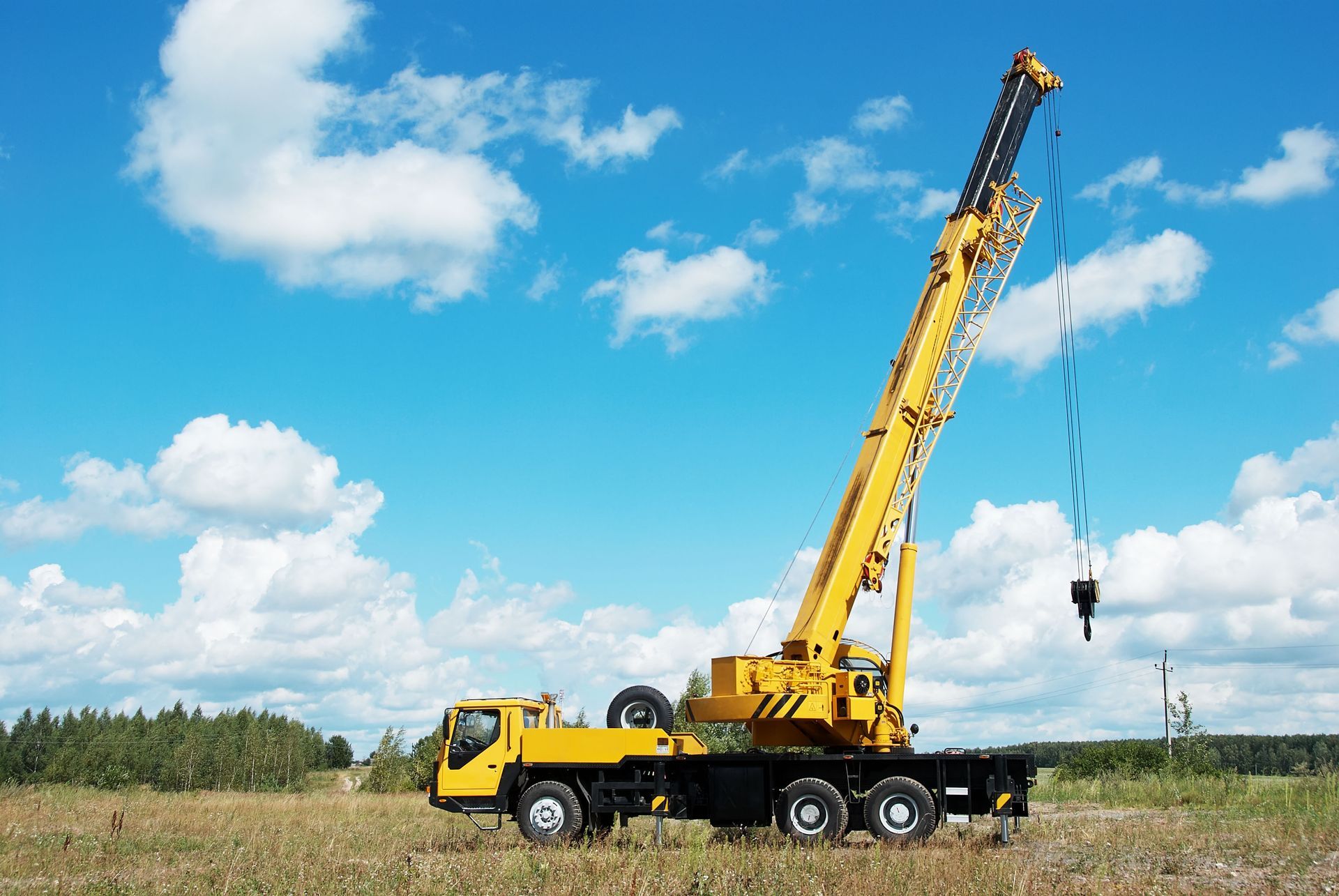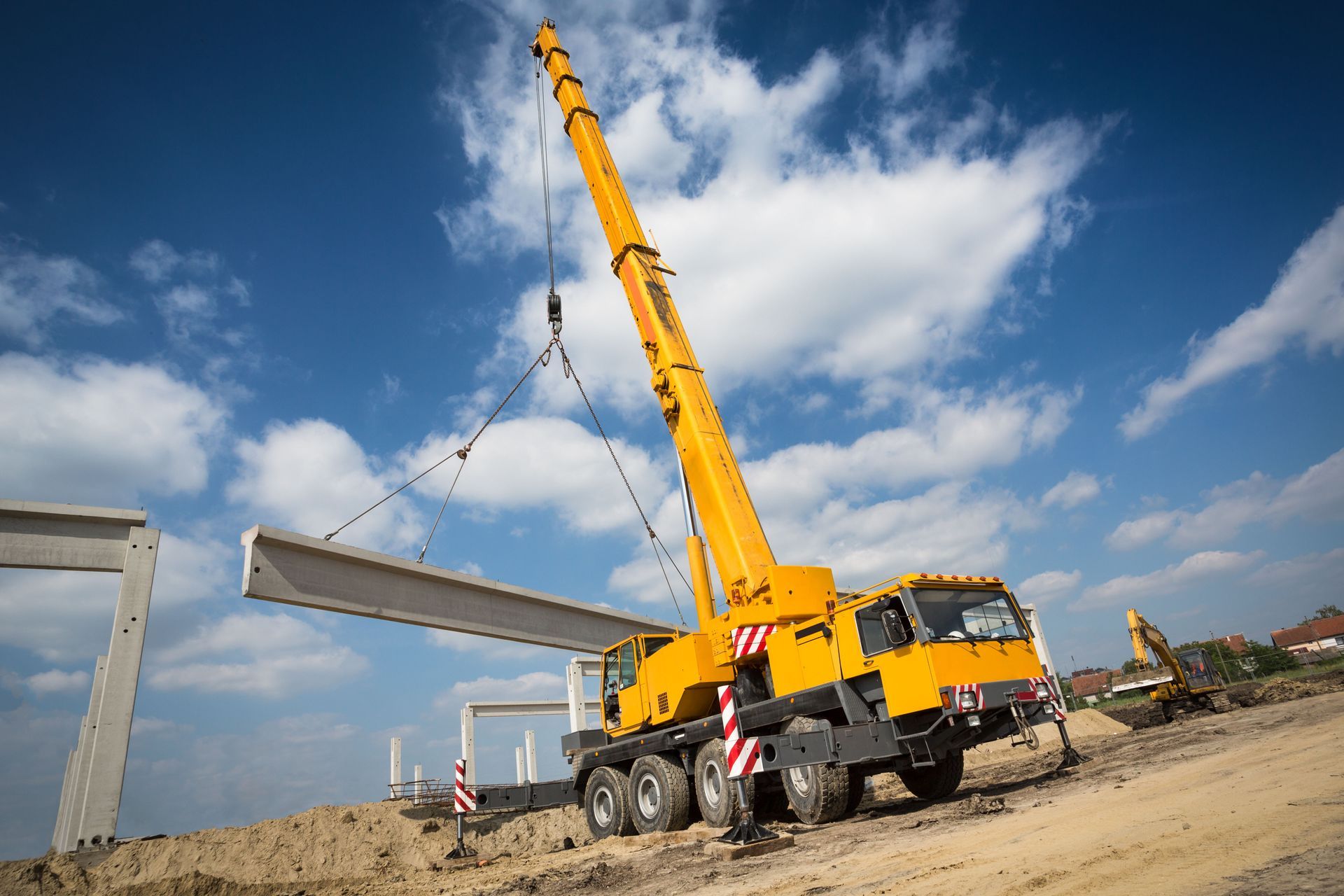Why Roofing Contractors Rely on Crane Rentals for Heavy Lifts
By Vincent Kundert | October 22, 2025
When you're working on a roofing job, safety and timing aren't optional — they're constants. Roofing contractors often face complex challenges when moving heavy structural elements, such as trusses, beams, or rooftop units. That's where a crane rental becomes essential. A well-executed heavy lift saves time, reduces labor costs, and mitigates risk. For roofing contractors, the right crane rental is more than a convenience — it is a strategic tool.
Why Efficiency Drives Project Success
Time is money in construction, and roofing is no exception. Without mechanized lifting, moving large roof components piece by piece or relying on manpower alone slows down the schedule and increases labor hours. A crane rental enables contractors to hoist heavy components precisely into place, reducing downtime and enabling follow-on work (sheathing, underlayment, flashing) to proceed without delay. The speed allowed by crane rental often offsets much of its cost, especially when every day on the roof adds expense, weather exposure, and risk.
Why Safety Demands Mechanical Lifting
Roofing sites already carry inherent hazards: heights, slopes, variable footing, and weather exposure. When heavy loads are involved, human error or overexertion can quickly escalate into injury, property damage, or schedule setbacks. With a proper crane rental, certified operators handle the lift, and rigging is planned and executed under controlled conditions. This reduces the chance of dropped loads, structure damage, or injury to crew. Roofing contractors favor crane rental because it transfers the most dangerous work to specialists who train specifically in load control, signaling, and safety protocols.
Why Load Capacity Influences Crane Choice
Not all cranes are created equal, and not all roofing jobs require the same lifting capacity. Some projects require lifting moderately weighted trusses or modular roof panels, while others demand hoisting heavy mechanical equipment or prefabricated roof sections. When contractors plan a lift, they must evaluate weight, reach, boom length, and site constraints. A crane rental provider can offer machines matched to those needs. In many cases, selecting the right size crane eliminates overkill costs; in others, selecting too small a crane risks underperformance or safety issues. The flexibility of crane rental allows contractors to scale up or down per project rather than invest in expensive in-house equipment.
Why Coordination Matters on the Jobsite
Roofing projects rarely happen in isolation — plumbing, HVAC, electrical, and site logistics must all synchronize. Introducing a crane to the project requires scheduling, site prep, and communication with other trades. Contractors rely on crane rental providers to coordinate mobilization, rigging plans, laydown areas, and load paths. The rental provider becomes part of the job sequencing, ensuring that lifts occur when materials, crews, and access are ready. Roofing contractors prefer crane rental when they can rely on the crane vendor to integrate with their schedule and site plan so the heavy lift doesn't become a bottleneck but an enabler.
Why Cost Transparency Builds Trust
One common concern is cost: roofing contractors want predictable expense lines. With crane rental, pricing is often tied to duration, hours on site, and the size of crane required. That transparency gives contractors confidence in bids and margins. According to HomeGuide, daily crane rental for setting roof trusses usually ranges from $200 to $700. Integrating that known cost into the roofing budget allows seen and unseen risk to be mitigated. Contractors know the baseline, and can factor in mobilization, operator hours, and rigging equipment with clarity.
Why Weather and Scheduling Favor Rentals
Roofing is highly susceptible to weather delays. Rain, wind, or storms can push work out by days. If a contractor owns a crane but it sits idle for weeks waiting on labor or permit delays, its capital cost is underutilized. Instead, contractors prefer the flexibility of crane rental: they can call the crane only when conditions align, and avoid sunk costs during idle periods. In tight weather windows, a crane rental can be mobilized quickly, helping crews capitalize on good conditions and keep roofing schedules as tight as possible.
Why Liability Protection Matters
Liability exposure during heavy lifts is significant — losses from dropped loads or improper rigging can involve repair, insurance claims, or litigation. A reputable crane rental company carries certifications, insurance, and rigorous inspections that reduce the burden on the roofing contractor. Contractors can rely on the crane provider's compliance, operator training, and safety protocols, which protect all parties. By outsourcing the risk of crane operations via a rental, roofing contractors can focus on their core work rather than managing crane liability in detail.
Why Scalability Supports Varied Projects
Roofing contractors often take on diverse jobs: from small residential homes to large commercial buildings. Buying, maintaining, and storing cranes of various capacities is often impractical. Instead, crane rental provides flexibility to scale the machine to the project. When doing a small job, a compact crane might suffice; for large commercial roofs, a high-capacity crane is rented for the duration. This scalable model keeps capital investment low while giving access to premium lifting equipment on demand.
Why Site Constraints Require Expert Handling
Roofing sites sometimes have tight access, limited laydown zones, overhead utilities, or uneven terrain. These constraints require careful planning and specialized lifting techniques. Crane rental providers often offer equipment suited to constrained environments (such as rough terrain cranes, boom trucks, or all-terrain cranes). Their experience in overcoming site challenges is especially valuable. Roofing contractors rely on crane rental vendors to anticipate obstacles and propose rigging and positioning solutions so that the heavy lift doesn't damage surrounding structures or delay progress.
Why Reliability Hinges on Vendor Reputation
When a lift isn't completed as scheduled, the domino effect can derail the entire roofing timeline. Contractors know that a crane breakdown or operator no-show can cost far more than the rental itself. That's why roofing contractors prefer crane rental vendors who demonstrate reliability, maintenance schedules, operator backup, and responsive service. A dependable rental partner reduces unexpected downtime, giving the contractor peace of mind that the heavy lifts will go off without surprises.
Why Coordination With Inspection and Permitting Is Critical
Most roofing lifts require adherence to local codes, structural inspections, and safety oversight. Crane rentals often include coordination with permitting, load calculations, and pre-lift inspection support. Roofing contractors count on the crane rental provider to present engineered lift plans, equipment certifications, and documentation required by inspectors. That coordination smooths the path to regulatory approval and helps prevent jobsite delays when the lift must be reviewed before execution.
Why Competitive Bids Lean on Crane Inclusion
As roofing contractors bid projects, including a line item for crane rental enhances credibility and clarity in proposals. Clients see that the contractor has accounted for heavy-lift logistics rather than leaving that as an afterthought. In competitive tendering environments, contractors who present detailed budgets (including crane rental costs) outperform those who estimate generically. The ability to deliver heavy lifts confidently becomes a differentiator. Roofing contractors rely on crane rental not just as a tool, but as a selling point in competitive bids.
Why Continuous Innovation Drives Demand
Crane technology keeps advancing: lighter ballistic booms, hybrid power cranes, remote control rigs, and more flexible outriggers. Rental fleets adopt new models, offering roofing contractors access to cutting-edge lifting capacity without large capital investment. Instead of purchasing the newest crane every few years, contractors can lean on crane rental vendors who refresh their fleets. This continuous innovation means contractors can take advantage of new features — higher reach, greater precision, lower ground pressure — through crane rental rather than owning outdated machinery.
Why Trust Builds Long-Term Partnerships
Over time, roofing contractors and crane rental providers often build repeat relationships founded on reliability, communication, and shared experience. A contractor who returns to the same crane rental partner learns the ropes: the partner knows preferred lifts, access routes, rigging patterns, and local conditions. That institutional knowledge speeds mobilization, reduces surprises, and tightens coordination. Contractors increasingly rely on crane rental providers as a trusted adjunct to their core operations.
Why Investment Returns in Reliability
Rather than allocating capital toward purchasing, maintaining, inspecting, storing, and licensing multiple cranes, roofing contractors often see better return on investment by outsourcing heavy lifts via crane rental. That capital can instead be deployed in workforce, materials, marketing, or other growth areas. The ROI of outsourcing heavy lift work, when compared to owning lifting assets, often points clearly toward crane rental. Because crane rental compresses cost, risk, maintenance, and down-time into predictable terms, contractors can direct attention to their core competencies.
In the roofing industry, heavy lifts cannot be entrusted to chance or makeshift systems. Roofing contractors rely on crane rental for precision, speed, safety, scalability, and cost transparency. From tight access jobs to large commercial roofs, crane rental enables contractors to execute complex lifts without committing huge capital or absorbing unmanageable risk. A reliable crane rental partner, backed by certified operators and experienced lift planning, turns heavy lifts from bottlenecks into enablers of efficiency, safety, and profitability. If you're looking for a crane rental, contact Larry's Crane today.




Share On: